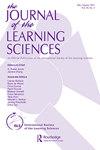恢复黑人女孩的未来:用女性主义的叙事方法重新想象计算机教育中的主流叙事
IF 3.9
1区 教育学
Q1 EDUCATION & EDUCATIONAL RESEARCH
引用次数: 0
摘要
学术研究表明,黑人女孩在计算机领域想象未来的能力受到了白人男子气概和计算机领域内对女性的厌恶的限制。在种族批判代码研究和身份作为叙事理论的基础上,我们研究了通过黑人女性主义讲故事的方法来恢复黑人女孩在设计和重新想象她们的计算机未来时整合交叉身份的方法。我们的问题是:女性主义的叙事方法如何支持一个黑人女孩恢复可能的计算机未来?方法我们提出了一个案例,集中在一个研究参与者,希瑟,在一个更大的工作坊中,边缘化的年轻人重新想象了关于计算机科学(CS)的主导叙事。这是通过使用纸质电路和微控制器创建交互式被子补丁,挑战整个领域中白人男子气概和厌女症的主流叙事。我们看到,通过女性主义的叙事方法进行修复,使Heather能够(1)通过以黑人女性的认知和行为方式为中心,在计算机科学教育中解构白人男子气概和厌女症的叙事;(2)通过计算来回顾过去,制定可能的计算机科学未来和身份。在讨论中,我们通过将黑人女孩的经验与学习科学研究的思辨性方法相结合来解决挑战和成功。本文章由计算机程序翻译,如有差异,请以英文原文为准。
Restorying a Black girl’s future: Using womanist storytelling methodologies to reimagine dominant narratives in computing education
ABSTRACT Background Scholarship demonstrates that Black girls’ capacities to imagine possible futures in computing are constrained by narratives of white masculinity and misogynoir embedded within computing. Building on race critical code studies and identity-as-narrative theories, we examine restorying through Black womanist storytelling methodologies for integrating Black girls’ intersectional identities when designing and reimagining their computing futures. We ask: How might womanist storytelling methods support one Black girl in restorying possible computing futures? Methods We present a case focused on one study participant, Heather’s, restorying practices situated within a larger workshop wherein marginalized youth reimagined dominant narratives about computer science (CS). This was by creating interactive quilt patches using paper circuits and microcontrollers that challenged dominant narratives of white masculinity and misogynoir normalized throughout the field. Findings We see that restorying through womanist storytelling methods allowed Heather to (1) deconstruct narratives of white masculinity and misogynoir throughout CS education by centering Black women’s ways of knowing and doing, and (2) restory the past to enact possible CS futures and identities through computing. Contribution In the discussion, we address challenges and successes with integrating Black girls’ experiences with speculative methodologies in learning sciences research.
求助全文
通过发布文献求助,成功后即可免费获取论文全文。
去求助
来源期刊

Journal of the Learning Sciences
Multiple-
CiteScore
10.70
自引率
5.30%
发文量
17
期刊介绍:
Journal of the Learning Sciences (JLS) is one of the two official journals of the International Society of the Learning Sciences ( www.isls.org). JLS provides a multidisciplinary forum for research on education and learning that informs theories of how people learn and the design of learning environments. It publishes research that elucidates processes of learning, and the ways in which technologies, instructional practices, and learning environments can be designed to support learning in different contexts. JLS articles draw on theoretical frameworks from such diverse fields as cognitive science, sociocultural theory, educational psychology, computer science, and anthropology. Submissions are not limited to any particular research method, but must be based on rigorous analyses that present new insights into how people learn and/or how learning can be supported and enhanced. Successful submissions should position their argument within extant literature in the learning sciences. They should reflect the core practices and foci that have defined the learning sciences as a field: privileging design in methodology and pedagogy; emphasizing interdisciplinarity and methodological innovation; grounding research in real-world contexts; answering questions about learning process and mechanism, alongside outcomes; pursuing technological and pedagogical innovation; and maintaining a strong connection between research and practice.
 求助内容:
求助内容: 应助结果提醒方式:
应助结果提醒方式:


